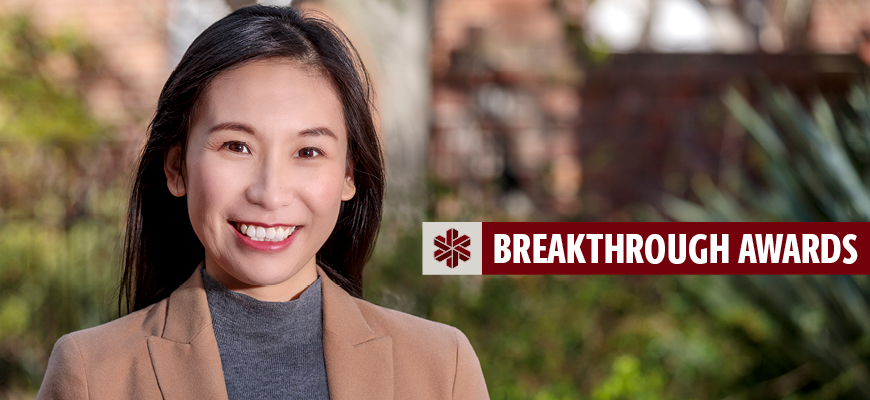
Breakthrough Star: Taylor Wen
Advertising professor studies connection between emotions, media messages
Posted on: July 26, 2022; Updated on: July 26, 2022
By Page Ivey, pivey@mailbox.sc.edu, 803-777-3085
In an era when facts are discounted while highly improbable information is accepted as gospel, Taylor Wen is looking at how our emotions affect the way we process communication.
“I especially interested in how emotions interplay with media messages and how that influences audiences — their cognitive, affective and behavioral responses,” says Wen, an advertising professor.
Her work looks particularly at health and risk communication, as well as general advertising.
“I think the uniqueness about my research is how I use different cutting-edge tools to study this concept.”
Wen is the director of the Biometrics and User Experience Lab in the College of Information and Communications. The biometrics tools in this lab measure physiological reactions to gauge emotions in real time, rather than simply asking research subjects how a message made them feel.
With the biometrics tool, we are able to document constant recording from the first second (or even milliseconds) they are exposed to the messages — where their eyes are looking or their facial expressions.
Taylor Wen
That self-reporting could be influenced by what a subject thinks their interviewer wants to hear.
“With self-report, we know that data quality sometimes would not be very accurate — like ‘I need to think about how I am feeling at this moment and I have to justify my feelings,’ ” Wen says. “With the biometrics tool, we are able to document constant recording from the first second (or even milliseconds) they are exposed to the messages — where their eyes are looking or their facial expressions.”
Wen says biometrics can capture the range of emotions subjects experience during a message.
“We don't think emotion is a static process,” she says. “Instead, we think of it more as fluid processes that would change over the course of the exposure.”
Wen explores messages around health issues, including vaccinations and teen tobacco use. She received grants from the University of South Carolina provost’s office and the American Academy of Advertising to study misinformation surrounding vaccines.
Wen says her lab can support research from across disciplines, not just advertising.
She is working with health communication and public health researchers to see how people, particularly young people, react to e-cigarette messaging. She also is working on collaborations with the College of Engineering and Computing, the College of Education and the National Center for Credibility Assurance at Fort Jackson.
“There are a lot of common interests from different partners across the university,” she says.
Wen also is excited about bringing students into the lab.
“I can translate the research expertise in biometrics to curriculum development and classroom teaching,” she says. “At the graduate level, I created a new biometric research class that is a very hands-on class.”